2 February 2021, by TRESS ACADEMIC
Many authors struggle with paper-writing because there are a few crucial decisions they haven’t made before they begin.Then, everything seems difficult and complicated, and it feels like you never make the progress you want, and you are never satisfied with what you achieve. If you make the 5 decisions that we suggest here before starting, you will get rid of a lot of trouble in paper-writing.
You want to be an efficient and content author of journal papers? Then don’t just sit down and start looking at figures, interpreting data, outlining a structure, or drafting some paragraphs. We recommend that you make decisions on the following 5 aspects that influence your paper-writing first thing:
1. What to include and what to leave out of your paper?
It seems like an easy question, but often authors struggle with it, or are not aware that they have not made a clear decision on the topic. Yet, the first thing to decide on a paper is its topic. What will this paper be about? What have you done that you can show? What is meaningful to include and—often forgotten—what is not? This is a decision about what to include and what to leave out.
It doesn’t increase the quality of your paper to include everything you’ve done. You risk confusing or boring the reader—or at least you risk blurring and diluting the message that you want to present.
Typically, authors look at what they’ve got and then they try to make a meaningful story out of it, but the story is twisted and squeezed as necessary to include all the material. We don’t recommend you do this. Rather, start from a clear research question, a problem that is clear and understandable to your readers. Keep everything that is not directly related to this question out of the paper.
The topic that you decide on at the beginning also determines what type of paper you’re aiming for: a research paper, a methods paper, a review paper, or others. Find out more about the characteristics of these paper types in our post #28: What type of journal paper to write?
2. Why do you want to write this paper?
Here, your goal is to make clear what your motivation for the paper is. The most common answer we received on this question from students in our paper-writing courses is “because I have to”. Is this really your motivation?
Do you need the paper to complete a degree (e.g. your PhD), or to complete a project? Do you write it because your contract is going to end, and you’re afraid that there won’t be time anymore? Do you work on it because somebody is expecting output from you, or are you writing it because you need papers for your next career move? Think about it, because there’s always a motivation behind writing a paper. The more you’re aware of it, the better you can incorporate it into your writing strategy.
A second reason why it’s good to think about this question early on has to do with the relevance of your work. Why do you want peers to read your paper? What do you think they get out of it? Why do you think your paper is worth publication in a journal?
This is the second important decision to make. Whatever the motivation to write your paper is, you should make sure that this is your focus from the start. It should not be the reader’s task to find out what is so important and relevant about your work—your entire paper should be set up to highlight it. Knowing your motivation and relevance clearly from the start will help you get your paper published.

3. For whom do you write this paper?
No, you’re not going to write this paper for your boss, your supervisor or the PI of the project. Papers are written for readers, not line-managers! Who are the potential readers of your paper? Whom do you expect to read it? Is it written for a very specific audience in your field of research, like a niche audience, or is it written for a broader research community?
Think about who benefits most from it, and then try to adjust your writing to their level of expertise. What do these researchers already know? Are they familiar with work like yours, or would it be new to them? What would you need to explain?
There is never just one audience—you always have a choice to focus more on one or another group. The earlier you decide, the more targeted your writing will be, and the less rewriting is needed afterwards.
The question of the audience is, in the end, also the question of which journal you’ll submit to. Once you decide on your target audience, try to find a journal that serves this audience because you want to ensure that those people find your paper. Don’t write just for anybody and try to find just any journal—this is far more difficult and takes more time then knowing from the start for whom you write.
4. With whom do you write the paper?
What we mean with this question is who are the colleagues who are actively writing the paper with you? Or are you doing it alone? Or are you the sole writing author, and have a bunch of less active co-authors? You see, the question needs to be clarified as it has a huge influence on the process and the timeline of your writing!
If you’re a single author and have no—active or non-active—co-authors, then everything is in your hands. You can decide on all aspects of the paper, but it is also you who has to do everything. That doesn’t mean you cannot ask for advice from experienced colleagues on how to deal with a problem!
If your paper is the result of a collaborative research effort, you’ve got more hands to help, but you’ve also got more opinions on how the paper should look. In such a multi-authored situation, an agreement on the roles and responsibilities of the diverse authors is indispensable. Our free checklist “Co-authorship roles” will help you to draft such an agreement.
If you find yourself in a situation where quite a few people were involved in your research and they will all very likely claim a spot on the list of authors but it is you who is doing all the work on the paper itself, a clear agreement is even more important. It can feel bad to do all the work on the paper and then realise that others did not contribute a lot but are still authors on the paper.
Two suggestions on how to handle this situation:
First, make sure that you claim your first authorship on the paper so that you at least get the credit that you deserve. Check our post #78: How to tell my co-authors that I should be the first author? On how to do this properly, including a free template for a message that you can send to your colleagues to Claim your first authorship.
Second, if you don’t feel happy about the passive role of your co-authors, change the situation. It is on you to make use of the expertise and experience of your co-authors. You can find great tips about how to activate your co-authors in our post #23: What to do if my co-authors don’t contribute?

5. When and how do you write the paper?
The decision to write a paper is great, but often hampered by practicalities. Even if you decided on the four aspects discussed above, it could still take a lot of time until your paper is complete. Why? Sometimes there is a threshold between deciding to write the paper and the actual writing of the manuscript.
This threshold is built up by statements like “no time right now”, “it’s not a good moment now”, “I need to do something else first” or “I’m not sure I know enough yet”. While this might all be true, it still doesn’t bring you closer to finishing the paper!
Instead, think about answering questions like: When would I like to be finished with the paper? How much time can I spend daily or weekly working on the paper? When would be a good time for me to write: in the morning in the office, in the afternoon, or in the evening back home? How will I start the writing process?Introduction, Methods, or what would be a good section to begin with? Do I need information from my co-authors to write some specific section? When can they deliver this information? What stops me from writing a bit more on my paper every day?
We suggest you find answers to these questions and plan your writing process till the end of it. Think about how much time it will cost you and allocate it in your calendar. We’ve got a few great blog posts to help you in this process:
- Writing productivity: Write more in less time
- Train your writing muscle: Achieve better results
- Lessons learned from our paper-writing students!
- How to get started with writing papers?
Conclusion
We presented five decisions that, if decided early on, make the start and the writing of your paper easier. These aren’t simple yes-or-no decisions that need to be made, and you will probably have to sit down and think a while about the best answer. But if you do it at the beginning, you’ve got it out of the way, and, all in all ,it will speed up the writing process. You will be faster at producing the manuscript that you’re looking forward to having completed!
Relevant resources:
- Blog post #28: What type of journal paper to write?
- Checklist “Co-authorship roles”
- Blog post #78: How to tell my co-authors that I should be the first author?
- Message template Claim your first authorship
- Blog post #23: What to do if my co-authors don’t contribute?
- Bog post #67: Writing productivity: Write more in less time
- Blog post #63: Train your writing muscle: Achieve better results
- Blog post #40: Lessons learned from our paper-writing students!
- Blog post #5: How to get started with writing papers?
More information:
Do you want to successfully write and publish a journal paper? If so, please sign up to receive our free guides.
Photo by Usman Yousaf on Unsplash.
© 2021 Tress Academic
#WritingPapers, #PaperWriting, #publishing #journals
